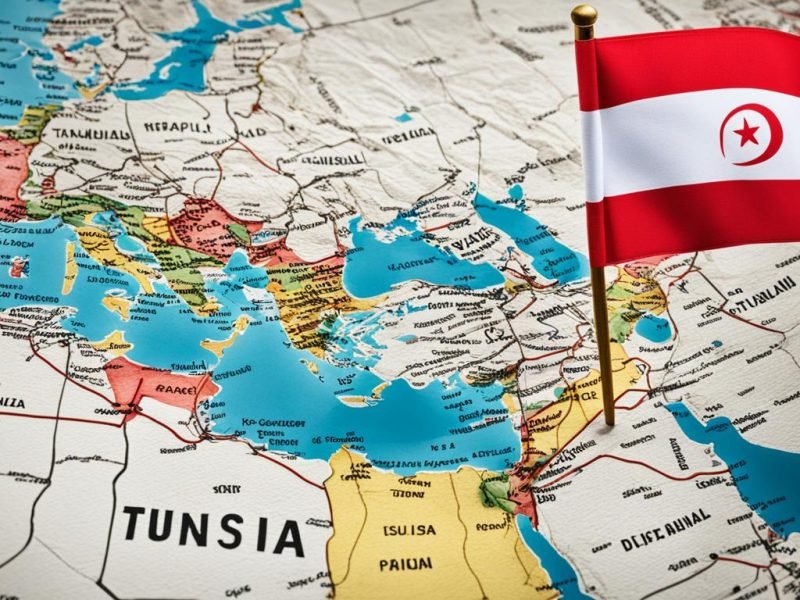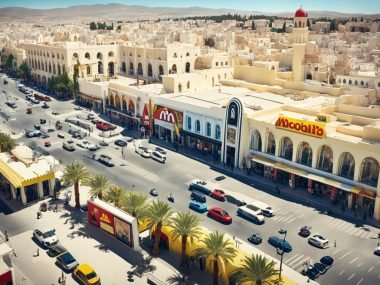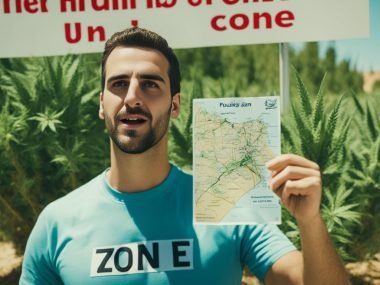When it comes to Middle East peace, we often forget to ask about Tunisia. I’m a journalist looking into where Tunisia stands on Israel. This topic is complex, filled with history, politics, and what people feel. Tunisia has no official ties with Israel, even though it’s a moderate Sunni country. This is due to politics and a need to stick with nearby countries like Algeria. Through my research, I found that many in Tunisia don’t want ties with Israel. They mainly support Palestine, especially after events in Gaza. Exploring this helps us understand Tunisia’s part in Middle East peace better.
Key Takeaways
- Tunisia maintains no formal diplomatic ties with Israel, reflecting both regional politics and internal sentiment.
- The country’s position is shaped by its desire to keep positive relations with Algeria and other regional players.
- Tunisian President’s viewpoints exemplify the official stance against normalization with Israel.
- Public opinion in Tunisia significantly leans towards support for the Palestinians and criticism of Israeli policies.
- Tunisia’s stance on Israel remains a significant factor within the broader context of the Middle East peace process.
Unveiling the History of Tunisia-Israel Relations
Looking into Tunisia-Israel diplomatic ties means understanding a history full of careful talks and clear clashes. This history is part of Tunisia’s foreign policy towards Israel and the important role of Tunisian Jews. These relations show the complex politics in the changing area around them.
Early Contacts and Quest for Tunisian Independence
In the early 1950s, Tunisia began to form a relationship with Israel. Leaders met with Israeli officials at places like the United Nations. They quietly asked for support for Tunisia’s independence, showing careful diplomacy.
Secret Meetings and Cooperative Ventures
After becoming independent in 1956, Tunisia had private talks with Israel. They met secretly, like the talks with Israel’s ambassador to France. These discussions set the stage for a possible stronger relationship. But, regional pressure and public views kept the relationship limited.
Diplomatic Shifts Post-Operation Wooden Leg
The 1985 Operation Wooden Leg by Israel hurt Tunisian land and people. It was aimed at a PLO base but also impacted Tunisians. This caused negative feelings towards Israel, although secret talks continued. Efforts to improve ties after the 1991 Madrid Conference were short-lived. The Second Intifada in 2000 made things worse.
Understanding Tunisia’s diplomatic approach shows a history of both peace efforts and conflicts. As these relations evolved, they highlighted the role of Tunisian Jews. They also influenced the political and social situations in the area.
Tunisia’s Role in the Israeli-Palestinian Peace Process
Tunisia plays a big role in Middle East peace talks. It’s tricky for them because of their ties to Israel. Their secret part in the Oslo I Accord talks was very important. It shows they want to help bring peace to the region.
After the Oslo Accord, Tunisia started to see Israel differently. They began to talk and even visit each other. But this did not last long. The Second Intifada made their relationship get worse again.
When I talk to experts, they say Tunisia is in a tough spot. They’re trying to push for peace but also have to listen to what people at home and nearby want. These people often don’t want them to be close to Israel.
“Tunisia’s diplomatic dance is pivotal in understanding the complexities encompassing the peace process in the region,” one analyst elaborated during a recent discussion.
Our talks often show how hard it is for Tunisia. They want to help peace talks but also have to think about politics at home and abroad. Watching these events tells us a lot about peace in the area. It’s something the world is watching closely.
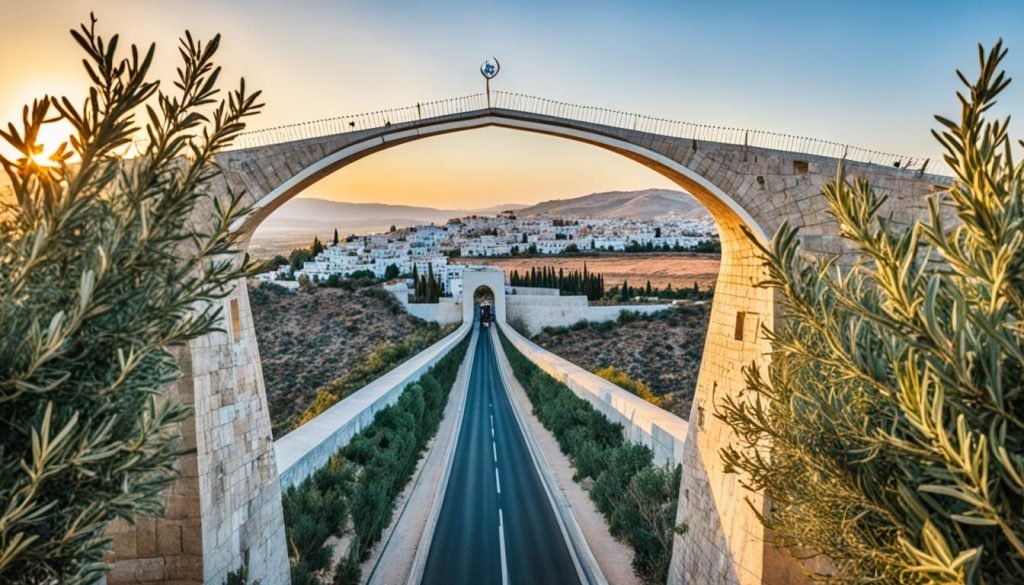
The Complexity of Tunisia-Israel Political Relations
The ties between Tunisia and Israel have many layers. They go back years. Behind the public eye, both countries have engaged secretly, despite openly expressing disapproval. We’ll look into these hidden and public interactions.
Clandestine Contacts Amidst Public Hostility
Even with public rejection, Tunisia and Israel talked quietly. This happened especially during ex-President Ben Ali’s time. They used Belgian embassies for secret chats. These talks were crucial for keeping diplomatic ties.
Tunisia’s Involvement in Multinational Exercises
Tunisia joined international military drills, like Sea Breeze 2021. Israel was there too. This shows a hint of cooperation on security. It’s despite their political differences.
This dual strategy by Tunisia shows how it deals with Israel. There’s a mix of public statements and secret actions. It’s a complicated relationship.
| Event | Description | Year |
|---|---|---|
| Sea Breeze 2021 | International military exercise involving Tunisia and Israel among other nations, indicating a nuanced approach to security cooperation despite political frictions. | 2021 |
| Belgian Embassy Mediation | Facilitated discreet communications between Tunisia and Israel during periods of heightened strain. | 1990s – 2000s |
Tunisia’s foreign affairs show a blend of pragmatism and caution. This balance respects both national interests and regional expectations. Despite opposing normalization openly, Tunisia subtly navigates its relationship with Israel.
Sporting Events as a Barometer of Relations
Sporting events often show how countries get along. They are more than just games. They can show or challenge the political situation between nations. For Tunisia and Israel, sports events show the complex tension between them.
Political Implications of Athletic Competitions
Politics and sports often mix in quiet but important ways. Athletes and sports groups can show political opinions through their actions. This is clear when Tunisian athletes don’t just compete. They also make political statements against Israeli competitors.
International Response to Tunisian Athletes’ Decisions
When sports choices get political, the world takes notice. These actions affect how people see Tunisia and Israel. Global leaders and groups watch these events closely. They know sports can change diplomatic relationships. This shows how sports and politics are deeply linked.
| Event | Impact on Tunisia-Israel Relations | International Reaction |
|---|---|---|
| Withdrawal from Tennis Tournament | Highlighted political standpoints, increased tensions. | Global sports communities debated political neutrality in sports. |
| Participation in International Matches | Temporary easing of tensions due to global sportsmanship spirit. | Positive international media coverage, promoting peace through sports. |
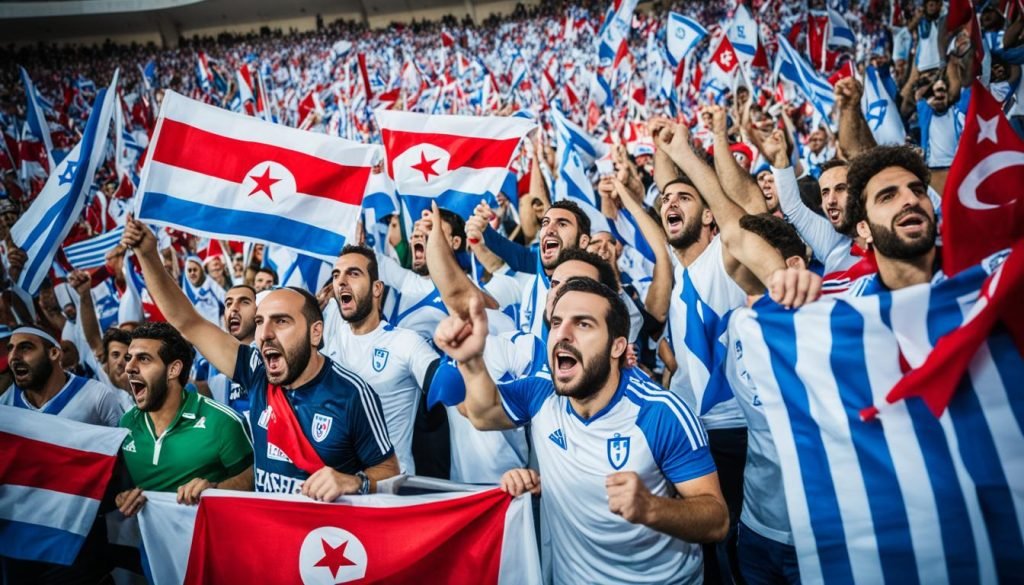
Tunisia-Israel Relations: The Legal and Social Conundrum
When we look at Tunisia’s views on the Israel-Palestine conflict, we see a deep connection. Tunisia’s laws and what people think both play a big role in shaping its foreign policy. Lately, Tunisia has made clear it’s against being friendly with Israel. This is something both the public and lawmakers in Tunisia agree on strongly.
Legislative Efforts Against Normalization with Israel
At the heart of Tunisia’s legal actions is a bill. It sees any friendliness with Israel as a major betrayal. This bill is a strong sign of how Tunisians feel about this topic. It also sets tough consequences for those who try to seek or support such friendliness.
Public Opinion and Parliamentary Debates
Tunisians mostly agree on their view of Israel. This is evident in many ways, like protests and important talks in parliament. President Kais Saied and other lawmakers often share these views. They speak up for Palestinian rights and say no to making peace with Israel.
| Aspect | Public Opinion | Parliamentary Action |
|---|---|---|
| Normalization with Israel | Strongly opposed | Legislation drafted against it |
| Support for Palestine | Widespread and robust | Endorsement by government leaders |
| Penalties for Normalization | Advocated by activists | Severe penalties proposed |
Assessing Tunisia’s Foreign Policy Towards Israel
Exploring Tunisia’s policy on Israel, I find a mix of history, politics, and law. The conflict with Israel often sparks public and government resistance against formal ties. My findings suggest that while some covert talks happened, they didn’t show a real change.
Tunisia’s stance is shaped by society and laws against normalizing relations with Israel. Laws to criminalize any normalization highlight the strong opposition. This legal approach backs up Tunisia’s foreign policy and support for Palestine.
Looking at Tunisia and Israel, I see a policy that won’t change soon. President Kais Saied’s statements match the public view, sticking closely to Palestine. This shows how strong beliefs inside a country guide its dealings with others.

